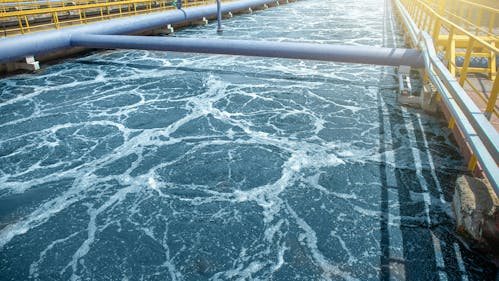Managing wastewater is challenging, but it doesn’t need to be. With the right processes, it can be a source of new revenue and even become an environmental solution for your community. In this blog we will discuss specific steps you can take to manage your wastewater in an environmentally responsible way.
Water treatment is one of the most important systems in your facility. If you don’t treat wastewater before releasing it into the environment, it can cause significant harm. Luckily, there are a lot of ways to manage wastewater without having to spend a lot of money. The key is finding the right systems that will work best for your needs and resources.
What is Wastewater?
Wastewater is water that has been used in manufacturing or in an agricultural setting. It can contain food waste, oil and grease, and even chemicals that were used in manufacturing. Wastewater can contain pathogens, like bacteria and viruses, that can cause disease.
It can also contain solids and liquids like oil, grease, and wipes that can harm water treatment processes. It can be especially dangerous if wastewater is not managed properly. If the wastewater is not treated properly, it can cause damage to treatment equipment and downstream users like potable water systems or irrigation systems.
For example, oil and grease in wastewater can damage pipes, causing water to be trapped in pipes and creating a pothole.
Why Is Managing Wastewater Important?
Wastewater is a resource that can be used to generate revenue. The right wastewater management practices can also lead to cost savings and resource optimization. For example, municipal wastewater systems can be used to recharge groundwater or aquifers. So if you are in an area where the water table is low, you can use wastewater to replenish the aquifer.
How to Manage Waste Water?
Wastewater treatment systems treat wastewater to prevent it from causing harm. Wastewater treatment can remove harmful constituents, like bacteria and viruses, from wastewater and make the remaining water suitable for reuse. There are a lot of different types of treatment systems, like:
Advanced Wastewater Systems: Advanced wastewater systems can provide both primary and secondary treatment. The primary treatment removes the harmful constituents and contaminants, like bacteria and viruses. The secondary treatment removes odor, color, and taste. Advanced wastewater systems can also be combined with other energy sources, like solar, wind, and/or hydro.
Advanced Wastewater Systems with Integrated Treatment: Advanced wastewater systems can be combined with an integrated treatment system that removes odor, color, and taste. An integrated treatment system can be combined with a waste water treatment system or a wastewater reuse system. Integrated treatment systems can be found in residential, commercial, and industrial facilities.
Reuse: Many wastewater treatment systems can be used to treat and reuse water. Reuse systems are designed to treat wastewater, like advanced wastewater systems, and then reuse treated water for potable water purposes.
Example of “How-to” Strategies for Managing Wastewater
There are a lot of different ways you can manage your wastewater. The best way will depend on your specific needs. Here are a few examples that may be useful for your specific wastewater management needs:
- Integrated Wastewater Treatment Systems:
Integrated treatment systems take a “one-stop shop” approach to wastewater management. It combines the treatment of two or more systems. It can be an advanced wastewater system combined with an integrated treatment system.
In an integrated treatment system, an advanced wastewater treatment system provides the treatment and other systems receive the treated water. For example, an integrated system can be an advanced wastewater system combined with a flood control system and/or a groundwater recharge system.
- Advanced Wastewater Systems with Membrane Technologies:
Advanced wastewater systems can be combined with membrane technologies. Membrane technologies can remove harmful constituents that are in wastewater. And advanced wastewater systems can be combined with advanced technologies, like micro-filtration and ultra-filtration.
Advanced wastewater systems can be combined with membrane technologies, like micro-filtration, ultra-filtration, reverse osmosis, and hybrid membranes. And advanced wastewater systems can be combined with other energy sources, like solar, wind, and/or hydro.
- Advanced Wastewater Systems with Automation:
Advanced wastewater systems can be integrated with automation technologies, like programmable logic controllers, to increase reliability, to increase reliability and reduce the risk of human error in a regulatory environment.
Final Tips for Managing Wastewater
Know Your Treatment System: Make sure you know what type of treatment system you have. If your treatment system is not appropriate for your wastewater, you may end up having to treat it later.
Have a Plan: When it comes to wastewater management, having a plan is essential. Without a plan, you are likely to make mistakes and end up having to spend time and money to correct them.
Invest in Quality: Your wastewater treatment system is an important part of your facility. Make sure it is of high quality. It should meet the minimum requirements set by regulators.
Maintain Your Treatment System: Make sure you follow the maintenance schedule for your treatment system to ensure it is running properly.
Invest in Future Costs: You should also consider investing in future treatment system upgrades and new treatment system technology that will help you manage your wastewater in the future.
